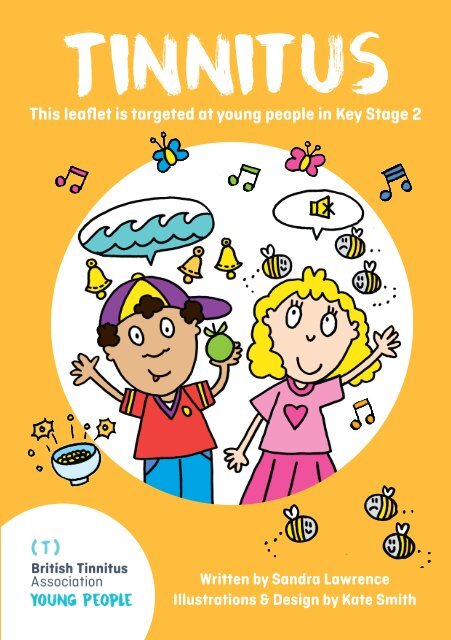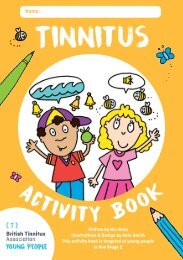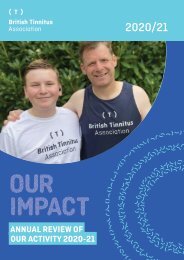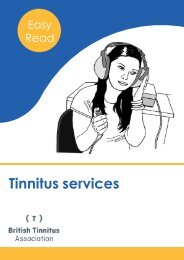Tinnitus (Key Stage 2)
Information booklet for children aged 8-11 who have tinnitus
Information booklet for children aged 8-11 who have tinnitus
Create successful ePaper yourself
Turn your PDF publications into a flip-book with our unique Google optimized e-Paper software.
<strong>Tinnitus</strong><br />
This leaflet is targeted at young people in <strong>Key</strong> <strong>Stage</strong> 2<br />
Written by Sandra Lawrence<br />
Illustrations & Design by Kate Smith
What is <strong>Tinnitus</strong>?<br />
<strong>Tinnitus</strong> is when your brain hears a sound inside your head or ears<br />
that doesn’t have a matching sound outside. Some people hear<br />
buzzing or ringing, others might hear whooshing or humming. A few<br />
even hear musical sounds!<br />
<strong>Tinnitus</strong> is very common. If you ask other children in your class, you<br />
may be surprised how many hear noises in their ears at times. Most<br />
people aren’t bothered by it but some find it quite upsetting. If you<br />
are finding it annoying there are lots of things you can do to make it<br />
better.
Am I going deaf?<br />
It is important to get your ears checked if you think you have a<br />
problem with your hearing or have noticed tinnitus. Your ears could<br />
be blocked if you have a cold or a lot of ear wax.<br />
If you already wear a hearing aid, you might be aware of tinnitus<br />
when you aren’t wearing it, as the brain doesn’t have any outside<br />
noises to listen to.<br />
Will I get better?<br />
In most cases tinnitus gets better and even goes away. This is<br />
because the brain forgets it’s listening to the sound.<br />
It’s called ‘habituation’.
Is there a cure?<br />
Because tinnitus isn’t a disease, there isn’t a ‘cure’ for it but there<br />
are loads of things you can do to make it better. If we listen out for<br />
tinnitus our brains will think it is important and will keep listening<br />
to it. Our bodies make lots of noises our brain usually doesn’t listen<br />
to like chewing, or rumbling tummies. When it gets used to the<br />
tinnitus the brain stops listening to that, too. It can help to give your<br />
brain more interesting noises to listen to, such as quiet music or<br />
the radio.
Will I need an operation?<br />
There aren’t any operations for tinnitus, though sometimes<br />
operations can treat things that cause tinnitus.<br />
What can I do about it?<br />
Everyone is different. Once you’ve worked out how tinnitus affects<br />
you, and what makes it quieter, you can start to make up ways<br />
to make it better. You might notice it’s quieter when there is<br />
background noise, or the complete opposite, it is better when you<br />
are in silence.
Often it’s very simple things like moving away from noisy people<br />
in class or having a fan or a radio nearby that makes a small,<br />
constant sound to soothe your brain.<br />
<strong>Tinnitus</strong> can seem worse when you’re worried about something. You<br />
can learn how to relax so your brain calms down. Talking with other<br />
people about what your tinnitus is like and how it affects you can<br />
help too.
Should I wear a hearing aid?<br />
If you have a long term hearing loss, a hearing aid can help you hear<br />
sounds around you better, and your brain will be able to ignore the<br />
tinnitus sounds better.<br />
Is there anything that will help<br />
make my tinnitus quieter?<br />
Sometimes playing some quiet music or having another sound, like<br />
a fan or the radio in the background will help. You can also download<br />
other sounds, such as waves on a beach, that may help relax your<br />
brain.
Sometimes MY TINNITUS WON’T<br />
LET ME SLEEP<br />
There are lots of things you can try. Learning how to relax and calm<br />
your mind can help. Try doing something quiet before you go to<br />
bed, perhaps reading a book, so that your brain gets ready to sleep.<br />
Watching TV or playing computer games just before bedtime makes<br />
your brain excited, so that it’s not relaxed when you want to go to<br />
sleep.
Sometimes I can’t hear my<br />
teacher in class.<br />
Other people can’t hear your tinnitus so they will not know you have<br />
it unless you tell them. If it is a problem in class, do talk to your<br />
teacher. That way if you can feel it coming on, your teacher can take<br />
extra care to make sure you hear everything. If it gets very annoying,<br />
sometimes being allowed to have a break can also be helpful.
Sometimes MY TINNITUS MAKE<br />
ME FEEL SAD OR UPSET<br />
While most children are not really bothered by their tinnitus, some<br />
people can find it annoying at times. If it does make you feel<br />
upset, there are lots of things that can help, such as learning to<br />
relax properly and talking to other people about how you feel.
The most important thing is to keep healthy and enjoy your life.<br />
When you’re having good times with hobbies, sports and fun things<br />
your brain is less interested by the sounds tinnitus makes and just<br />
ignores them.<br />
There are lots of things to try when you need help, such as<br />
relaxation and using sound. It’s important to remember that most<br />
people’s tinnitus goes away by itself and you don’t need to do<br />
anything.
<strong>Tinnitus</strong><br />
This leaflet is targeted young people in <strong>Key</strong> <strong>Stage</strong> 2<br />
Information for those in other age groups is also available,<br />
please contact us for copies.<br />
Full details of all the information consulted in the production<br />
of this leaflet are available on request.<br />
Issued July 2021. Version 1.5. To be reviewed July 2024.<br />
© British <strong>Tinnitus</strong> Association<br />
© Design & illustrations by Kate Smith 2014<br />
The British <strong>Tinnitus</strong> Association<br />
Ground Floor, Unit 5,<br />
Acorn Business Park,<br />
Woodseats Close,<br />
Sheffield<br />
S8 0TB<br />
United Kingdom<br />
Email: helpline@tinnitus.org.uk<br />
Helpline: 0800 018 0527<br />
www.tinnitus.org.uk<br />
The British <strong>Tinnitus</strong> Association.<br />
Registered charity no: 1011145.<br />
Company limited by guarantee no: 2709302.<br />
Registered in England<br />
Whilst the BTA makes every attempt to ensure<br />
the accuracy and reliability of this information,<br />
it is not a substitute for medical advice.<br />
You should always see your GP/medical professional.


















